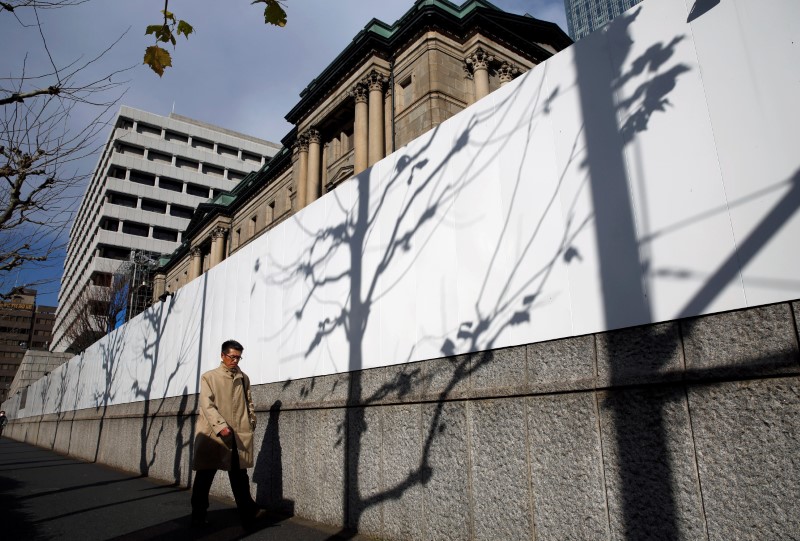 © Reuters. Man walks past the Bank of Japan building in Tokyo
© Reuters. Man walks past the Bank of Japan building in TokyoBy Leika Kihara
TOKYO (Reuters) – The new Bank of Japan leadership won’t be able to raise interest rates this year as the central bank missed the best opportunity to do so in 2017, former BOJ board member Sayuri Shirai said on Wednesday.
Stable markets, solid economic growth and a tightening job market would have allowed the BOJ to kick off the process of normalizing its crisis-mode stimulus last year, Shirai said.
But the recent market sell-off has made it difficult for the central bank to seek an exit from ultra-easy policy, underscoring the challenges BOJ Governor Haruhiko Kuroda faces heading into his second, five-year term, Shirai said.
The BOJ has been slowing its bond purchases recently, which traders have described as ‘stealth tapering’, though a decisive move to normalize policy has proven tricky partly because inflation continues to lag the central bank’s 2 percent target.
“The BOJ should be dialing back stimulus to prepare tools to deal with the next recession, which could come around 2019. The best chance to do this was last year,” Shirai told Reuters.
“With that opportunity missed, the BOJ won’t be able to move for quite a long time. It might be tough for the new leadership to normalize policy,” she said.
Shirai, a former International Monetary Fund economist who served at the BOJ board until March 2016, retains close contacts with incumbent and overseas policymakers.
The government last week reappointed Kuroda for another term and chose an advocate of bolder monetary easing as one of his deputies, a sign policymakers are in no rush to turn off a sweeping stimulus program.
But the rising cost of prolonged easing, especially the hit to bank profits from near-zero rates, means the biggest task for the new BOJ leadership would be to engineer a smooth exit from ultra-easy policy, analysts say.
After shifting to a policy targeting interest rates from the pace of money printing, the BOJ has gradually slowed its bond buying to around 50 trillion yen ($464 billion) per year. That compares to the 80-trillion-yen pace the BOJ loosely commits to sustaining.
The central bank will likely slow the pace to around 30 trillion yen, as years of huge purchases have lead to a dearth of bonds to buy, she said.
Raising long-term interest rate target or slowing the BOJ’s purchases of exchange-traded funds (ETF) would be difficult given pressure from premier Shinzo Abe to keep supporting growth and boosting stock prices, she said.
Fusion Media or anyone involved with Fusion Media will not accept any liability for loss or damage as a result of reliance on the information including data, quotes, charts and buy/sell signals contained within this website. Please be fully informed regarding the risks and costs associated with trading the financial markets, it is one of the riskiest investment forms possible.
Source: Investing.com



























